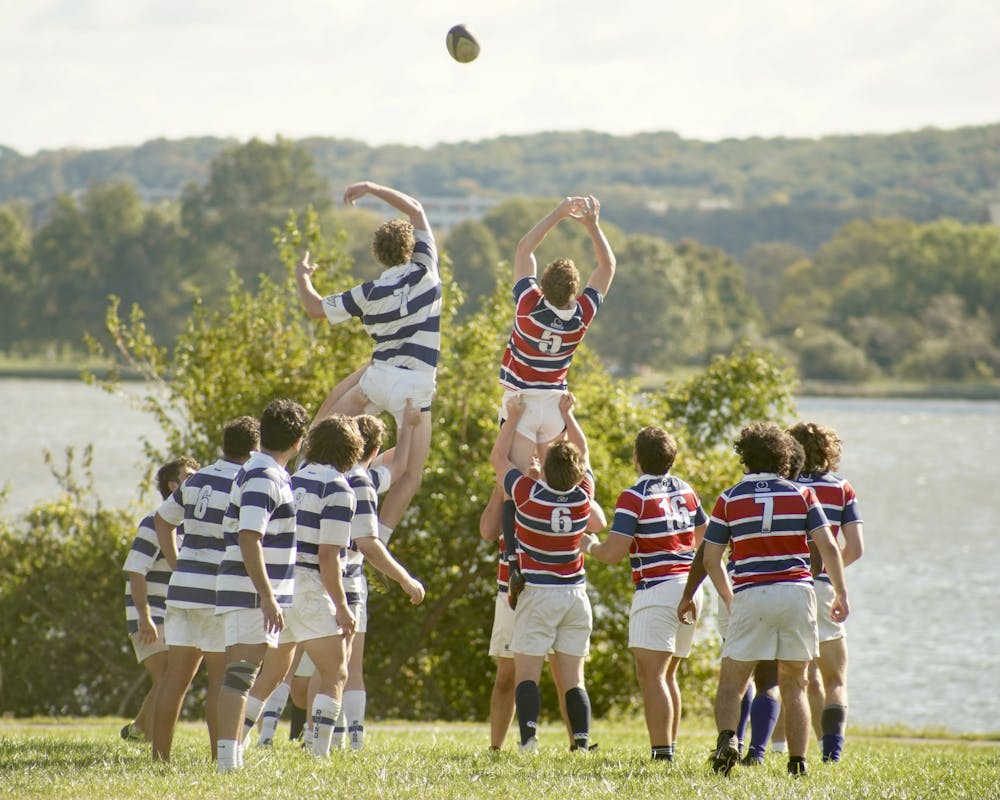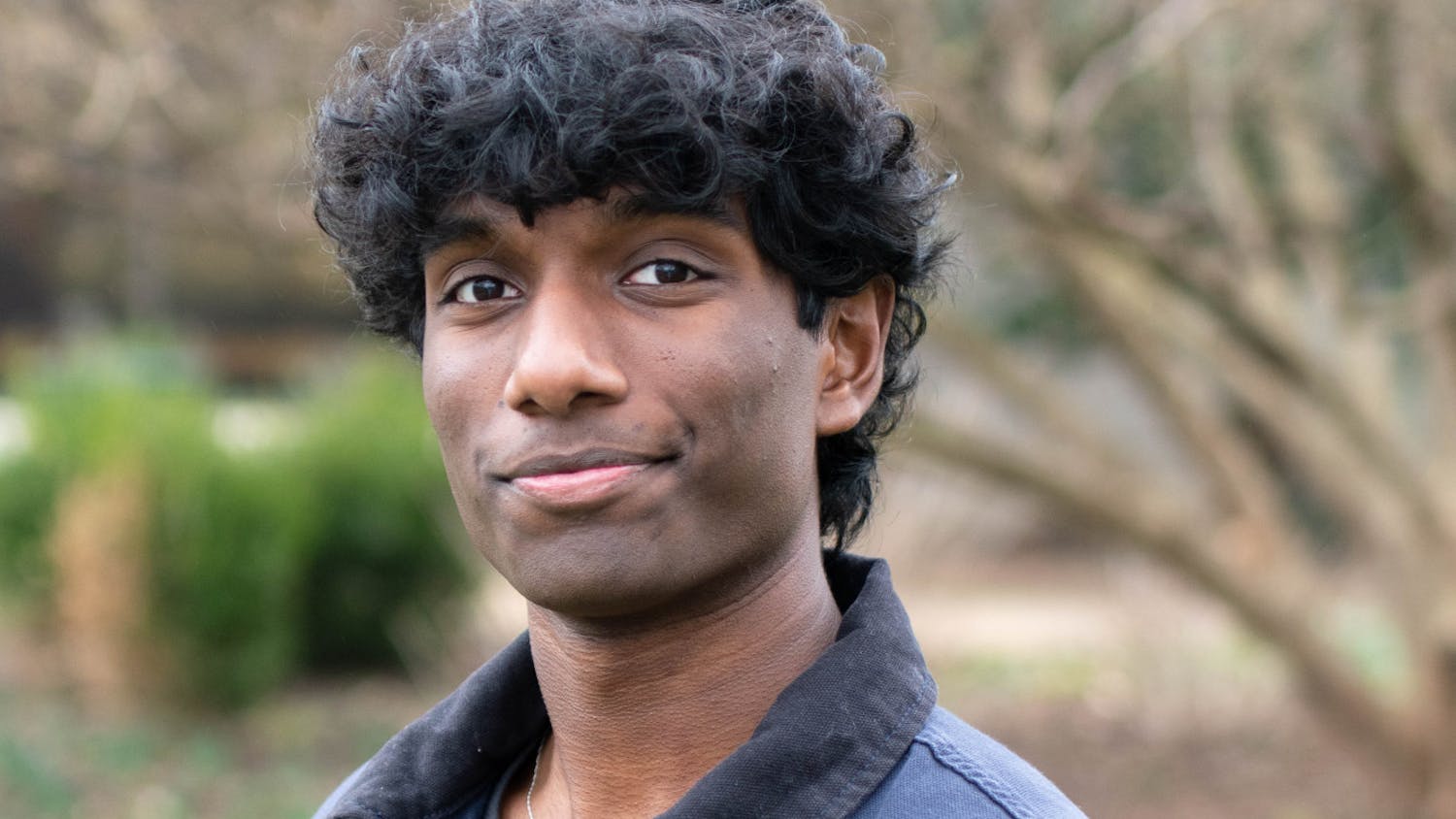It was a cold November night at Catholic University. 30 athletes had just spent 76 minutes running into each other, incurring cuts and wounds, scoring points and leaving everything they had on the pitch. The score was 24-18, with American in the lead. Catholic is ranked #4 in the country for the small college division and was undefeated going into the match.
With three minutes left, Catholic scored a try, bringing the score to 24-22, and bringing them a conversion away from tying the match. While AU gathered themselves, Catholic took the kick, which looked promising as it spiraled through the crisp air, before missing just wide of the uprights. Unadulterated joy took over the American team, as they stormed onto the pitch and embraced, having upset one of their top rivals.
Going into the match, everything seemed stacked against American, a team that practices on a hill in Tenleytown, given no field space from the University. A team that was restarted only three years ago due to a University-sanctioned suspension and the coronavirus pandemic. A team mostly made up of people who had never played or heard of the sport before entering college.
So how did they do it? How did American University manage to defeat the fourth-ranked team in the nation?
The resurgence of rugby at American can be mostly attributed to the persistence of two students, Luis Gutierrez Noboa and Andrew Ward, who are both now seniors. Luis is the team’s president, and Andrew is the captain. Both of them were interested in playing rugby at AU, and they were disappointed to learn upon arriving that the team no longer existed. The club sports office connected the two, who quickly began going to work on putting the team back together.
Noboa and Ward put in countless hours as freshmen during the pandemic, contacting the team’s coaches, recruiting people to play, filling out paperwork and making sure that everything would be ready to go by the 2021-22 school year.
One issue that they ran into was field space. Rugby is a sport that tears up fields, and American does not provide the team with any field space to practice on. The team then either has to play on a slanted hill in Tenleytown, or they have to travel to Gravelly Point in Arlington, nearly a 30-minute journey from campus. With the sun setting increasingly earlier, it has been difficult for the team to find quality practice time, which Noboa said may be inhibiting their capacity to improve.
“I do believe that we could be an even better team if we had lights and if we had a playing field,” Noboa said.
That first year, the team played only friendly matches with no real stakes. On any given matchday they did not know how many people would show up, and if they would be able to play 15s or have to play 7s. So how in just two years was that team able to rise so quickly to success?
According to the team, it’s their inclusive nature, which is accentuated by the fact that many had never played before coming to college. Senior scrum-half Isaac Fackrell started with the team because he was looking to play a new sport in college and he knew his dad had played. Sophomore second-row forward Cooper Bergen was recruited to come to practice one day while he was working out in the gym and Gacina just saw the team on the club sports portal and decided to check it out. Since attending their first practices, none of them have looked back.
“It doesn’t matter where you come from, it doesn’t matter your political beliefs or your religious beliefs,” Noboa said. “It really doesn’t matter if you’re a freshman or sophomore or junior. If you wear that shirt with me on the field then you are one of me. And you deserve the same respect.”
Bergen echoed this team mindset, “You put your body on the line on that field,” he said. “So we are going to be there for each other no matter what.”
Due to its deep history, the rugby club has a vast network of alumni who like to stay connected. Most of the coaches are alumni, and they are beloved by the members of the team.
“They are all amazing people,” Fackrell said. “I don’t think anyone on the team could speak negatively about them.”
At the game against Catholic, the stands were full of rugby alumni, who were ecstatic to witness the program’s continued success.
Moving forward, there is optimism all around for club rugby at American. Currently, the team is looking to advance in the playoffs, and Noboa is optimistic for the club in future years: “I’m very optimistic of the place where the team is going to be in a few year's time. We’ve only gone up from where we started.”
Noboa believes rugby is teaching the team important life lessons. “The philosophy of rugby is one that you can take in life,” Noboa said. “And that is: Life is tough. Life’s not fair. Life is a bitch. And, just like in a rugby game, it’s gonna beat you and it’s gonna keep beating you all your life. If you get up from those punches and you keep moving forward, you’ll score in life. You'll achieve whatever goal you're trying to accomplish.”
This article was edited by Penelope Jennings, Delaney Hoke and Abigail Pritchard. Copy editing done by Isabelle Kravis and Daniel Carson.




